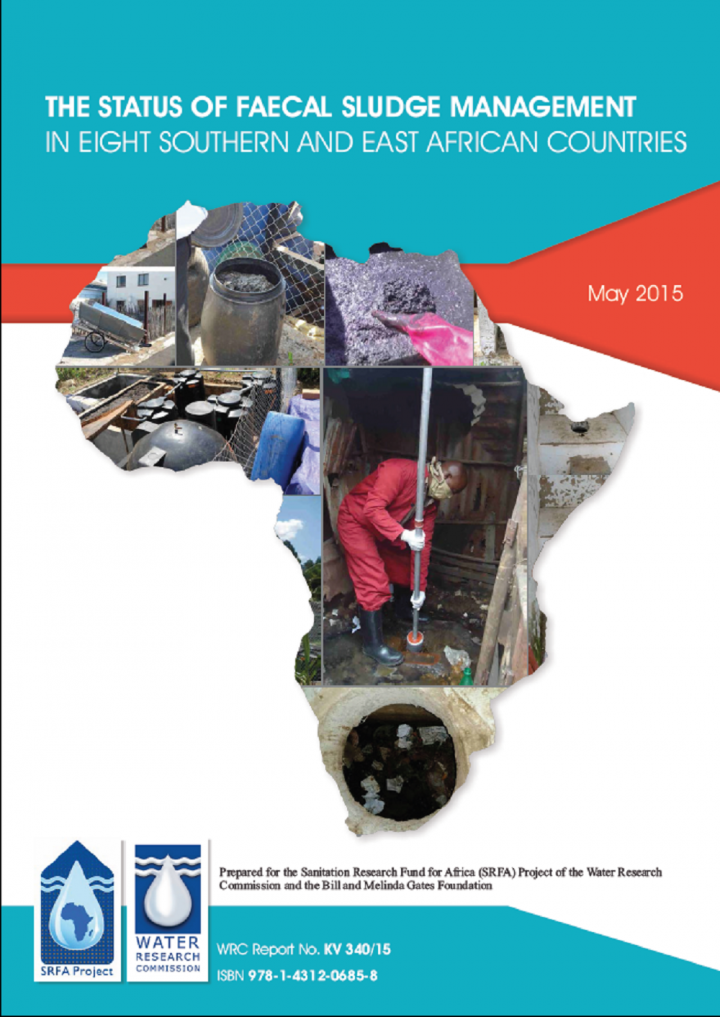
Published in: 2015
Pages: 76
Publisher:
WRC Report No. KV 340/15 , prepared for the Sanitation Research Fund for Africa (SRFA) Project of the Water Research Commission (WRC), Pretoria, South Africa, ISBN 978-1-4312-0685-8
Author:
WRC
Uploaded by:
SuSanA Admin
Partner profile:
common upload
10339 Views
215 Downloads
Location of library entry
In 2012, the Water Research Commission, together with the Bill and Melinda Gates foundation, took a strategic decision to develop capacity in Africa to deal with faecal sludge management. This initiative, known as the Sanitation Research Fund for Africa (SRFA) Project, provides an exclusive research and development grant of up to US$200 000 to African institutions and organisations.
12 African institutions and organisations from eight Southern and East African countries were awarded research grants:
a. East Africa: Kenya, Ethiopia and Malawi (2 research teams)
b. Central Africa: Uganda (2 research teams)
c. Southern Africa: Botswana, South Africa (3 research teams), Zimbabwe and Zambia
The Project comprises two focus areas:
a. The physical and chemical processes occurring in “dry” pit toilets and their contribution to the physico-chemical characteristics of faecal sludge, the level of pathogens and pit filling rates.
b. Technology for desludging, transporting, treating and disposing of faecal sludge, which would benefit people and the environment.
The first task of the research teams was to research the baseline conditions of faecal sludge management in their respective countries. This report presents a consolidated review of their findings, which cover the sanitation policy environment and faecal sludge management practices in these eight Southern and East African countries.
Considerations for the future:
Faecal sludge is a valuable resource that is still largely unexplored. It is evident that challenges and the areas
to be addressed listed above call for an integrated management solution that can turn faecal sludge from
waste to resource on a large scale.
It is essential that the sanitation managers of local authorities and utilities meet regularly at a sub-Saharan
forum to share success stories and lessons learnt. It is also essential that the required budgets, skills and
technology are harnessed to solve the faecal sludge problem of African cities effectively.
Possible focus areas:
- WASH campaigns that include educating children and adults (males and females) to be responsible
and hygienic toilet users and cleaners.
- Solid waste removal services to informal settlements. Privatising re-cycling services might work.
- A cost effective and safe alternative for the pit to solve the problems with pit-emptying and potential
groundwater contamination.
- Research and development of financially viable and scalable solutions for the treatment and re-use of
faecal sludge. The cost-benefit calculation must reverse the money flow, i.e. pay toilet owners or
collectors in money or by-products for faecal sludge.
- Supportive policy and legislation, and micro financing for the private sector to invest in these
solutions.
Bibliographic information
WRC (2015). The Status of Faecal Sudge Management in Eight Southern and East African Countries. WRC Report No. KV 340/15 , prepared for the Sanitation Research Fund for Africa (SRFA) Project of the Water Research Commission (WRC), Pretoria, South Africa, ISBN 978-1-4312-0685-8
Filter tags
English Faecal sludge treatment processes Peri-urban Practitioners Recommended by SuSanA (other than SuSanA publications) Sub-Saharan Africa Urban (entire city)














